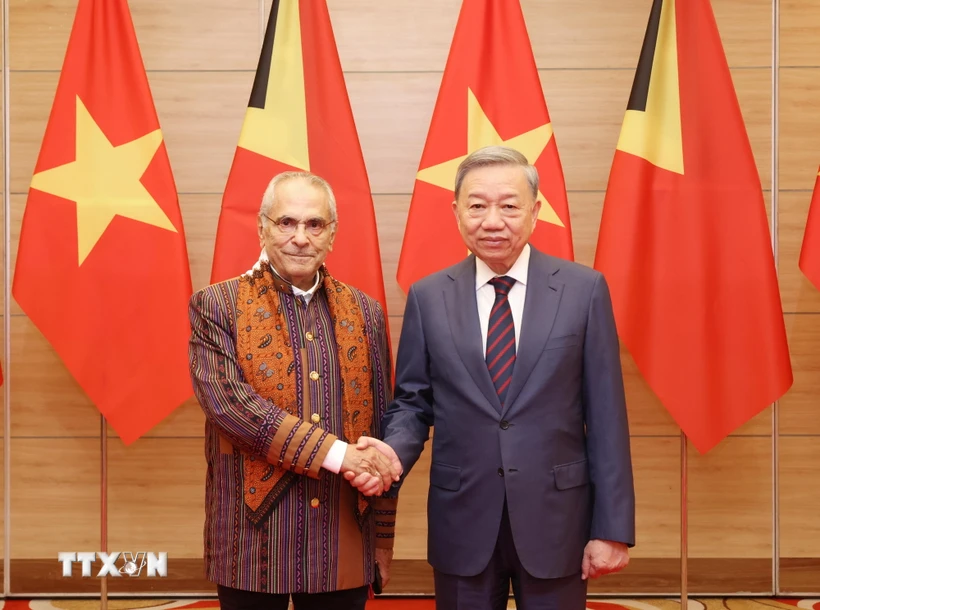Vietnam helps Timor-Leste ensure food security in new cooperation
The two Southeast Asian countries eye a new memorandum of understanding (MoU) on trading of rice in addition to other agricultural products from Vietnam.
Vietnamese State President To Lam affirmed that Vietnam will help Timor-Leste ensure food security through the supply of rice as well as foster cooperation with the neighboring country in other fields.
| Vietnamese State President To Lam (R) and Timorese José Ramos-Horta in Hanoi on August 1. Photo: VNA |
The statement was made at the meeting between To Lam and his Timorese counterpart, José Ramos-Horta, during the later’s ongoing visit in Vietnam.
The Vietnamese president also recommended renewing or signing a new memorandum of understanding on trade in this grain. Vietnam is one of the world’s largest rice exporters.
Additionally, he suggested Timor-Leste import more Vietnamese leading exports, including apparel, accessories, drinks, dairy products, processed foods, fish, and agricultural products.
He called upon Timor-Leste to soon ratify the bilateral trade agreement and support Vietnamese businesses looking to invest and expand their operations in Timor-Leste.
José Ramos-Horta’s four-day state visit to Vietnam, his third trip and the second in his position as Timor-Leste president to the Southeast Asian country in the past three decades, is expected to help boost cooperation between the two countries, which established diplomatic relations on July 28, 2002.
The Timorese president stated that he was interested in fostering strong, cordial relations between the two countries and looked to Vietnam as a development model.
He wished that Vietnam would keep sharing its knowledge and help Timor-Leste to improve its human resources, guarantee food security, and eradicate poverty.
Both parties committed to maximizing their potential for cooperation in other crucial areas, including infrastructure development, tourism, people-to-people exchanges, oil and gas, education, agriculture, fisheries, and telecommunications.
To strengthen bilateral relations, the two leaders agreed that there has been a significant progress in bilateral relations with through the exchange of high-level delegations.
Along with the successful implementation of the Framework Agreement on Technical and Economic Cooperation and the first ministerial meeting of the Việt Nam-Timor Leste Joint Commission for Bilateral Cooperation, the two nations expect to see an increase in delegation exchanges at all levels.
Regarding economic ties, the import-export turnover between the two countries exceeded US$15.9 million in 2023.
Meanwhile, Timor-Leste’s socio-economic development has also benefited from the efforts of Telemor, which is invested by Vietnam’s Viettel Military Industry and Telecoms Group (Viettel). Operated in 2012, Telemor is the biggest mobile operator in Timor-Leste. It is the only telecom company in Timor-Leste to have a fiber-optic network throughout the country covering 96% of population.
Timor-Leste’s telecom infrastructure has undergone a significant transformation thanks to Telemor as Timorese Prime Minister Xanana Gusmão said: “Telemor has quickly made remarkable differences and changes.”
Discussing regional and global issues, they decided to increase their support and collaboration in these forums.
Notably, President To Lam emphasized that Vietnam fully supports Timor-Leste’s bid for full ASEAN membership.
Meanwhile, President Ramos-Horta reaffirmed Timor-Leste’s support for Vietnam’s candidacy in multilateral forums such as the UN Security Council and the UN Human Rights Council.
They also expressed their support for the implementation of the Declaration on the Conduct of Parties in the East Sea (DOC), the negotiation of the Code of Conduct of Parties in the East Sea (COC), and the peaceful settlement of disputes based on international law and the 1982 UN Convention on the Law of the Sea (UNCLOS).
At the meeting, the two presidents witnessed the signing of an agreement to waive visa requirements for holders of official and diplomatic passports.









